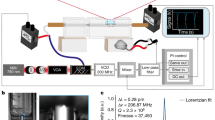Abstract
IN a recent communication, Rochester and Martin1 have commented on my note2 describing the construction of multiple monochromators, and claim that two similar ideas have been suggested previously. One of these suggestions, which is merely an extension of the Littrow principle, had not been published; the other3, so far as I am aware, has not been put into practice, and it remains to be proved that the method is practicable. Neither of these proposed methods can be extended for the construction of other than double monochromators. The same limitation applies also to the modification of my method proposed by Rochester and Martin. Comments on this will be reserved until they have tested this modification and published the results obtained.
This is a preview of subscription content, access via your institution
Access options
Subscribe to this journal
Receive 51 print issues and online access
$199.00 per year
only $3.90 per issue
Buy this article
- Purchase on Springer Link
- Instant access to full article PDF
Prices may be subject to local taxes which are calculated during checkout
Similar content being viewed by others
References
Rochester, G. C. O., and Martin, A. E., Nature, 168, 785 (1951).
Walsh, A., Nature, 167, 810 (1951).
Perkin–Elmer Instrument News, 1, No. 4, 3 (1950).
Author information
Authors and Affiliations
Rights and permissions
About this article
Cite this article
WALSH, A. Multiple Monochromators. Nature 169, 976–977 (1952). https://doi.org/10.1038/169976b0
Issue Date:
DOI: https://doi.org/10.1038/169976b0
Comments
By submitting a comment you agree to abide by our Terms and Community Guidelines. If you find something abusive or that does not comply with our terms or guidelines please flag it as inappropriate.



